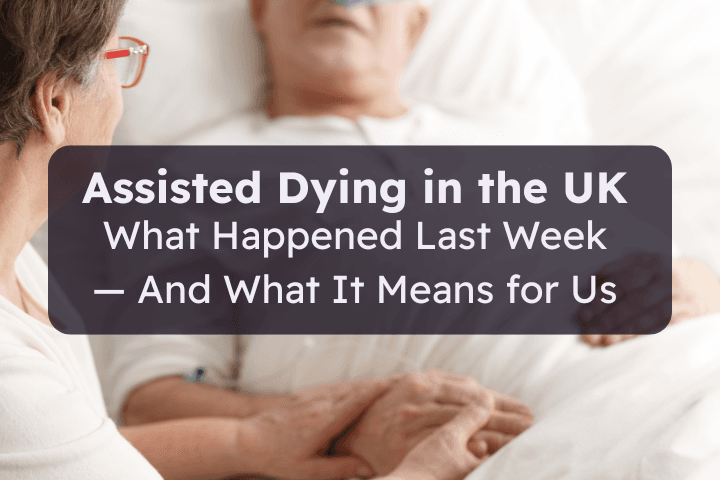All Articles
3 min read
Assisted Dying in the UK: What Happened Last Week — And What It Means for Us
Written by
Purpl
Published on
June 25, 2025

Last week, MPs gathered for a landmark debate on something deeply personal, complex and emotional: assisted dying.
It’s the first time in years that Parliament has formally reopened discussion on the law around assisted dying in England and Wales. While there wasn’t a vote to change the law just yet, the conversation is officially back on the table — and for many in the disabled and chronically ill community, that’s brought up a mix of hope, fear, grief, and frustration.
Let’s break it down.
What is Assisted Dying?
Assisted dying is when a terminally ill or incurably suffering person chooses to end their life, with medical support, at a time and place of their choosing. It’s currently legal in some countries and parts of the world — including Canada, parts of the US, and Australia — under strict criteria.
But in the UK, it’s still illegal. In fact, anyone who helps another person end their life can face up to 14 years in prison.
That’s what’s at the heart of this renewed debate: should people in the UK have the legal right to choose how and when they die, under controlled, compassionate circumstances?
What Did MPs Say Last Week?
MPs held a free vote debate — that means they weren’t told how to vote by party leaders, and could speak based on their own beliefs or the views of their constituents. The discussion was emotional, powerful, and full of personal stories. Some MPs talked about watching loved ones die in pain. Others raised concerns about safety, vulnerable people being pressured, or the message it sends to disabled people.
There wasn’t a formal vote to change the law — but the tone has shifted. Many MPs agreed it’s time to look again at the current ban. Some even shared support for a future bill to legalise assisted dying with strict safeguards.
In short: change isn’t here yet, but it might be coming.
Why This Matters to Disabled and Chronically ill People
This topic isn’t just about politics — it’s about us. Our bodies. Our lives. And sometimes, our deaths.
Some disabled people feel comforted by the idea of choice, autonomy, and dignity at the end of life. Others feel terrified — that a legal change could send a dangerous message that our lives are less valuable, or that people might feel pressure to die rather than be a “burden.”
The key issues here are about consent, safeguards, and support. Because unless we fix the broken systems that already fail disabled people — like lack of proper care, housing, financial support, and pain management — can we really call it a free choice?
Where Do We Go From Here?
This is just the start. A full legal change would need a bill, debates, votes in both the House of Commons and House of Lords, and loads of consultation. Campaigners on both sides are gearing up for what could be a major turning point in UK law.
Whatever happens, Purpl stands firm in one thing: disabled people’s voices must be heard. We deserve to be at the heart of this conversation — not left out of it.
This isn’t an easy topic. And there’s no one-size-fits-all answer. But we can have this conversation with compassion, truth, and care for each other’s lived experiences.
Support if You Need it 💜
This topic can bring up a lot. If you’re feeling affected, you’re not alone.
- Samaritans – 116 123 (free 24/7 helpline)
- Scope Disability Helpline – 0808 800 3333
- Mind – 0300 123 3393 or text 86463
- Compassion in Dying – www.compassionindying.org.uk
Whatever your views, you deserve to be heard, supported and respected.

Sammi is autistic, has ADHD, and lives with POTS. She’s passionate about disability advocacy, accessibility, and creating spaces where people feel seen, heard, and understood. With a sharp sense of humour and a deep love for community, she speaks openly about the realities of being neurodivergent across all of her personal platforms, always aiming to challenge stigma, spark conversations, and remind others they’re not alone.
Other articles you might like:
How to Contact Your MP to Stop The PIP Cuts
PIP Reform 101: Latest Update on Personal Independence Payment (PIP) Changes
What the UK Spending Review Means for Disabled People in the UK
Over 100 Labour MPs Oppose PIP Cuts: What It Means and How You Can Take Action
